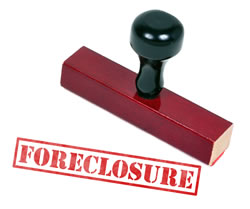Buying REO property or a foreclosure in Central Jersey?
Making an offer on a bank-owned property is not something to be taken lightly. For more information, you can
contact us through our site or
e-mail us. We're glad to answer any questions you have regarding real estate foreclosures.
What's an REO?
"REO" means Real Estate Owned. These are houses which have completed the foreclosure process that the bank or mortgage company presently possesses. This is not the same as real estate up for foreclosure auction. 
If you buy a property during a foreclosure sale, you must pay at least the loan balance plus any interest and other fees accrued during the foreclosure process. You must also be ready to pay with cash in hand. Finally, you'll accept the property completely as is. That possibly could include current liens and even current occupants that need to be evicted.
A bank-owned property, by contrast, is a much cleaner and attractive transaction. The REO property didn't find a buyer during foreclosure auction. Now the lender owns it. The bank will handle the elimination of tax liens, evict occupants if needed and generally arrange for the issuance of a title insurance policy to the buyer at closing.
You should be aware that REOs may be exempt from normal disclosure requirements. For example, in North Carolina, it is optional for foreclosures to have a Property Disclosure Statement, a document that ordinarily requires sellers to reveal any defects they are knowledgeable of. By hiring Homes & Loans Outlet, you can rest assured knowing all parties are fulfilling New Jersey state disclosure requirements.
Is REO property in Central Jersey a bargain?
It's sometimes thought that any foreclosure must be a good buy and a possibility for easy money. This often isn't true. You have to be prudent about buying a REO if your intent is to make a profit. While it's true that the bank is often anxious to sell it soon, they are also motivated to get as much as they can for it.
 Look closely at the listing and sales prices of similar properties in the neighborhood when considering the purchase of an REO. And factor in any repairs or upgrades necessary to prepare the house for resale or moving in. It is possible to find REOs with money-making potential, and many people do very well buying foreclosures. Still, there are also many REOs that are not good buys and may lose money.
Look closely at the listing and sales prices of similar properties in the neighborhood when considering the purchase of an REO. And factor in any repairs or upgrades necessary to prepare the house for resale or moving in. It is possible to find REOs with money-making potential, and many people do very well buying foreclosures. Still, there are also many REOs that are not good buys and may lose money.
Time to make an offer?
Most lenders have staff dedicated to REO that you'll work with while buying REO property from them. Usually the REO department will use a listing agent to get their REO properties listed on the local MLS.
Prior to making your offer, you'll want to contact either the listing agent or REO department at the bank and find out as much as you can about what they know regarding the condition of the property and what their process is for accepting offers. Since banks most commonly sell REO properties "as is", you'll want to be sure and include an inspection contingency in your offer that gives you time to check for unseen damage and cancel the offer if you find it. If, as a buyer, you can provide documentation demonstrating your ability to secure financing, such as a pre-approval letter from a lender, your offer will be more attractive and likely be accepted. (This goes for any type of real estate offer.)
Once you've made your offer, it's customary for the bank to make a counter offer. Then it will be your choice whether to accept their counter, or offer a counter to the counter offer. Your deal could be settled in one day, but that's usually not the case. Since offers and counter offers usually give the other party a day or longer to respond (and employees at a bank don't work nights or weekends) you could be looking at a week or longer. Homes & Loans Outlet is used to working around the schedules of this type of seller and will do everything possible to ensure there are no unnecessary delays.